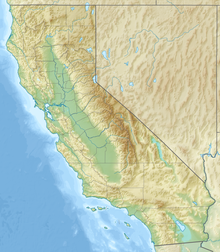Walker Pass
| Walker Pass | |
|---|---|

The approach to Walker Pass
|
|
| Elevation | 5,250 ft (1,600 m) |
| Traversed by |
|
| Location | Sierra Crest, Kern County, California, US |
| Range | Sierra Nevada |
| Coordinates | 35°39′47″N 118°01′37″W / 35.66306°N 118.02694°WCoordinates: 35°39′47″N 118°01′37″W / 35.66306°N 118.02694°W |
| Nearest city | Ridgecrest, California |
| Built | 1834 |
| NRHP Reference # | 66000210 |
| CHISL # | 99 |
| Significant dates | |
| Added to NRHP | October 15, 1966 |
| Designated NHL | July 4, 1961 |
Walker Pass (el. 5,250 ft (1,600 m)) is a mountain pass by Lake Isabella in the southern Sierra Nevada. It is located in northeastern Kern County, approximately 53 mi (85 km) ENE of Bakersfield and 10 mi (16 km) WNW of Ridgecrest. The pass provides a route between the Kern River Valley and San Joaquin Valley on the west, and the Mojave Desert on the east.
Walker Pass is a National Historic Landmark, and is under the stewardship of the Bureau of Land Management.
Walker Pass was charted as route through the Sierra in 1834 by Joseph Reddeford Walker and Garland Guthary, members of the Bonneville Expedition who learned of it from Native Americans. Walker returned through the pass in 1843, leading an immigrant wagon train into California. In 1845 the military surveying expedition of John C. Fremont used the pass. He suggested it be named after Walker.
The Walker Pass Lodge was built nearby in the 1930s and was a well-known rest stop before burning down around 1990.
It is the highest point on State Route 178. Aside from the paved road, the pass is essentially unaltered since Walker mapped it in 1834.
Between Walker Pass and Tioga Pass, several hours drive to the north, there is only one paved road for automobiles to cross over the Sierra Nevada mountains. It runs from the northern end of Indian Wells Valley at the east, to the hydrologic pass between the Great Basin and the Pacific Ocean at the top of the Nine-Mile Canyon road, then west along the Sherman Pass Road.
...
Wikipedia

